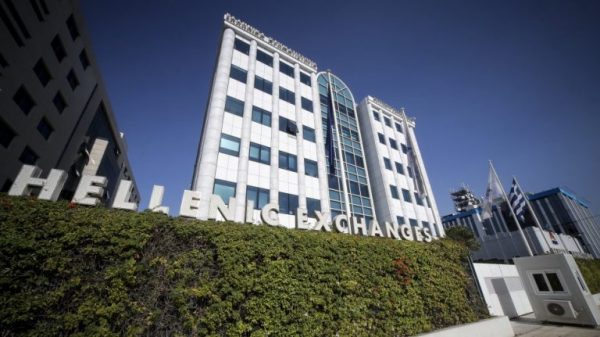
Minister of Development and Investments Adonis Georgiadis, and the head of main opposition SYRIZA’s sector chief for the same post, Alexis Haritsis crossed swords in OT’s level economic field, ahead of elections. The two political rivals were asked to position themselves on the burning issues of the economy, giving answers on how they will face the economic reality, if their parties manage the governance of the country, the day after the elections.
The “first course” concerned hiigh prices and high inflation, with the minister stating that “Citizens are rightly concerned about high prices, despite the fact that inflation in Greece is already falling at a rapid pace, faster than the rest of the eurozone”. At the same time he stressed that the phenomenon will last until 2023. Furthermore, he added that “anyone who says they have magic solutions for inflation is a fraud. The reality is that it’s a global phenomenon.”
On his part, Alexis Haritsis noted that: “The international dimensions are clear”, however he added that at this juncture “the importance of political choices emerges” to add that “the government failed”, stressing that it brought “an extremely problematic subsidy program that, instead of contributing to the de-escalation of inflation, has in fact functioned as a subsidy – with state money – of speculation and profligacy”. Mr. Haritsis also noted that: “The official figures of Eurostat certify the failure as they show a decrease in the real income of citizens and increase in inequalities in the last four years. While Greece also has the lowest GDP in terms of purchasing power in Europe of the 27, after Slovakia and Bulgaria”.
Solutions and indirect taxes
But what is the solution to the problem? The Minister of Development defended the government’s options, such as the “Household Basket”, the “Market Pass” and controls, while opposing indirect tax reductions, explaining: “The country in Europe that decided to reduce VAT so that the prices on the shelves drop is Spain. Three months now after it implemented this measure, it has higher food inflation than Greece.” In fact, he attacked SYRIZA, saying characteristically: “The idea that they reduce indirect taxes and prices drop on shelves, are lies. To cut to the chase, Mr. Tsipras and Mr. Tsakalotos, as Prime Minister and as Minister of Finance respectively, had explained to the Greek Parliament during their term in office why the reduction of VAT does not mean a reduction of prices on shelves”, while at another point he emphasized: “SYRIZA and none of its officials, nor Mr. Haritsis apparently, have given any explanation why Spain with 0% VAT has higher food inflation than Greece. None of them.”
At the same time, the Head of Development of SYRIZA retorted: “Indirect taxes are the most unfair socially, as they disproportionately affect the middle class and the weaker strata who consume most of their disposable income in the consumption of basic products and living services”. He attacked the government, stressing: “The figures published by OT a few weeks ago are revealing: the ratio of indirect and direct taxes has shot up in the four years 2019-2023 from 1.33 to 1.67, affecting the majority of society”. He also talked of dishonesty and the absence of controls, noting that “In a market that operates in terms of dishonesty, controls are non-existent and fines are minimal, according to the data from the Interagency Market Control Unit. It is unthinkable that only 1 auditor corresponds to 12,000 companies”. Furthermore, he added that “The government promoted the policy of subsidies which in the end proved to be extremely ineffective and unfair. If we continue on the same path, we will have the same results: high prices on shelves, subsidizing speculation, straining public finances.”
Investments and the Ellinikon project
The discussion moved to the crucial issue of investments and whether they are productive or not, on the occasion of the recent report of the Bank of Greece, but also some reports of former Prime Minister Costas Simitis. On the one hand, Adonis Georgiadis characteristically noteds: “This criticism is completely incomprehensible to me. The way we measure foreign direct investment on the planet is common. All foreign direct investment in the world includes business acquisitions and real estate. Where have you heard of foreign direct investment networks without acquisitions of companies and real estate?”, while Alexis Haritsis noted: “In order to attract productive investments we must immediately format a new national development plan. With financial incentives for dynamic small and medium enterprises, borrowing tools with full utilization of the Development Bank and a bold program of public investments and interventions that will attract private investments in the primary and secondary sectors”.
Regarding the issue of Ellinikon development project and the extent to which it is delayed, Mr. Georgiadis said that “The project from the master plan is expected to be delivered at the end of 2025 and it seems that it will be delivered a little earlier. So, it is running at a higher speed than predicted”, while adding that “Piraeus Bank has not withdrawn from the investment part of the project, nor is Eurobank thinking about it. Piraeus Bank withdrew from the memorandum of cooperation it had with Lamda for the transfer of its head offices to Elliniko”.
At the same time, Mr. Haritsis emphatically stated: “Since 2019, we have been hearing about bulldozers in Ellinikon. The only thing we have seen in these four years are the two consecutive virtual reality “openings” that Mr. Mitsotakis carried out. The result so far is a fiasco and this is sealed by the exits of investors and the whole image of the project. It is obvious that the Ellinikon case requires clear rules and a firm adherence to the investor’s obligation to ensure the creation of a public park and sports facilities.”
Bank nationalization
Finally, on the question of whether the country needs a state banking pillar, Mr. Georgiadis was clear: “Of course there should be no bank under public control, because what the world has not understood is that the shareholder should also be the public, the banks operate within the framework defined by the European Central Bank and the Bank of Greece within the framework of the Single Supervisory Mechanism. The things you remember from the past of the 1980s cannot be done in the Eurozone. The Minister cannot go to a bank and say give a loan here or there, nor change the banking criteria even if the public is the main shareholder. SYRIZA either does not understand this or simply does not tell the world.”
On his part, Mr. Haritsis, after stressing that 96% of Greek businesses do not have access to bank capital, stated that: “the State must recover its full rights as a shareholder of systemic banks. This is the prerequisite for the practical support of productive activities, the provision of liquidity to businesses and the encouragement of new investment initiatives. The state-strategist does not identify with a historical model of nationalization. It is the modern way of drawing up public policies: with public interventions in the economy, a relationship of cooperation rather than competition between the public, private and social sectors of the economy, an integrated development strategy and the pursuit of social and economic justice in terms of sustainability and resilience”.
Latest News

Mitsotakis Unveils €1 Billion Plan for Housing, Pensioners, Public investments
Greek Prime Minister Kyriakos Mitsotakis has announced a new set of economic support measures, worth 1 billion euros, aiming to provide financial relief to citizens.

Alter Ego Ventures Invests in Pioneering Gaming Company ‘Couch Heroes’
Alter Ego Ventures' participation in the share capital of Couch Heroes marks yet another investment by the Alter Ego Media Group in innovative companies with a focus on technology.

Corruption Still Plagues Greece’s Driving Tests
While traffic accidents continue to claim lives on Greek roads daily, irregularities and under-the-table dealings in the training and testing of new drivers remain disturbingly widespread

Pope Francis Died of Stroke and Heart Failure Vatican Confirms
As news of the official cause of death spread, tributes poured in from across the globe. The 1.4 billion-member Catholic Church is united in grief, remembering a pope who championed inclusion, justice, and compassion

Increase in Both Museum Visits, Revenues for 2024
As expected, the Acropolis was the top archeological site in the country, followed by Sounion, Mycenae, the ancient theater of Epidaurus, and Vergina in northern Greece

Where Greece’s Tourists Come From: A Look at 2025’s Top Visitor Markets
The United Kingdom continues to hold the top spot as the largest source of incoming tourism, with 5.6 million seats booked for Greece this summer — up 2.2% from last year. This accounts for 20% of all international air traffic to Greece

Pope Francis: A Pontiff Who Reshaped the Papacy and Sparked a Global Conversation
His first words from the balcony of St. Peter’s Basilica—“Brothers and sisters, good evening”—set the tone for a pontificate that would challenge norms, favor mercy over dogma, and bring the papacy closer to the people.

When Blue Skies was Unmasked as ND’s Political ‘Slush Fund’
The fact that so many top New Democracy (ND) party cadres were paid by the firm Blue Skies, owned by Thomas Varvitsiotis and Yiannis Olympios, without ever citing this publicly, raises very serious moral issues, regardless of the legality

Greek Women’s Water Polo Team Top in the World after 13-9 Win Over Hungary
The Greek team had previously defeated another tournament favorite, the Netherlands, to reach the final.

S&P Raises Greek Rating; BBB with Stable Outlook
S&P’s decision raises the Greek economy to the second notch of investment grade ladder, at BBB with a stable outlook.











![Πλημμύρες: Σημειώθηκαν σε επίπεδα ρεκόρ στην Ευρώπη το 2024 [γράφημα]](https://www.ot.gr/wp-content/uploads/2025/04/FLOOD_HUNGRY-90x90.jpg)


![Ξενοδοχεία: Μεγάλο το ενδιαφέρον για επενδύσεις στην Ελλάδα – Η θέση της Αθήνας [γραφήματα]](https://www.ot.gr/wp-content/uploads/2025/03/Athens-hotels-90x90.jpg)


![Airbnb: Πτωτικά κινήθηκε η ζήτηση τον Μάρτιο – Τι δείχνουν τα στοιχεία [γράφημα]](https://www.ot.gr/wp-content/uploads/2024/07/airbnb-gba8e58468_1280-1-90x90.jpg)
























 Αριθμός Πιστοποίησης
Αριθμός Πιστοποίησης